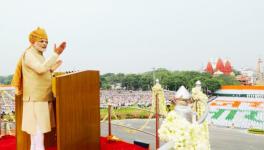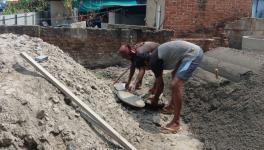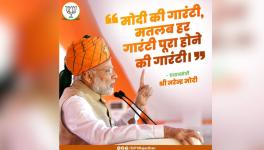Economy Shrinks Under Modi-fied India
Demonetisation has adversely impacted manufacturing and agricultural growth. This impact will be such, that we might see no growth in this last quarter of the year. There is an estimate of shrinking of the economy. Most active segments of the population who constitute the ‘base of the pyramid’ use currency to meet their transactions. These sections will lose income due to demonetisation. Cash stringency will compel firms to reduce labour cost and thus reduce income of the working class. When liquidity shortage strikes, consumption is going to be adversely affected. Reduced consumption, income and investment will bring down India’s GDP growth as the liquidity impact itself will last at least three - four months.
Prabir Purkayastha (Prabir): Hello and welcome to Newsclick. This program with The Real News. We are going to discuss the demonetization effects on the Indian economy and we have with us Rajat Nag, former Managing Director General of Asian Development Bank. Rajat, you have been a banker. Do you have examples of demonetization of this scale has been done for any economy, except when the currency has totally tanked..
Rajat Nag (Rajat): No, I don't and more worryingly even when demonetization has happened, including in India, twice actually 1946 and 1978, none of this scale and where it has been done even at a lower scale, it hasn't worked. So the evidence is fairly scanty.
Prabir: When you say it hasn't worked, sometimes the currenciestank. They become highly devalued and new currencies are put into place. So demonetization works for those kinds of scenarios.
Rajat: In that case, demonetization is neither here nor there because the currency as you said has already tanked, become worthless, so basically you bring in new currency. But India was no where near that situation, is nowhere near that situation and then to have a demonetization of about 86 percent of the value is quite staggering.
Prabir: So two issues here really. One is the objective of demonetization and other is the scale of the demonetization that has taken place. On the question of the objective of demonetization do you think that black money as an objective has been done in early demonetizations in different place?
Rajat: It has been and as a matter of fact that often is sort of the main objective. But, I think one has to be clear what do we mean by black money. One is the black wealth and the other is the black in cash. Now, the black wealth which is ill gotten wealth and basically, one on which tax has not been paid, is hardly held in cash. They are held in the form of properties in somebody else's name, gold and even more, just got out of the country and then brought back in the form of laundered money. So one has to be clear what is it that we are after. If we are after the amount held in cash: ill gotten, black cash, estimates vary from 6 to 15 percent, even 4 percent. Even if I am liberal and generous and make it 15 percent, is that really going to still come back and even on that evidence is scanty because people with that amount of ill gotten wealth will find ways of converting into lower denominations but paying a certain discount. So what's going to happen is large number of people with genuine five hundred and thousand rupees notes are the ones who will be inconvenienced dramatically.
Prabir: You know, it does appear that almost all the money is going to come back and the measures that the government has put in place recently saying that it will explain why you waited so long, while initially saying 30th December is the end date, don't worry, don't be in a rush, does it seem to indicate that the government is now worried that the money is coming back and they would like some money not to come back to declare success.?
Rajat: The whole point of demonetization would be if you can destroy that stock. Now, at the moment roughly about 80 -85 percent is already in and in the remaining few days of the year, probably, more will come in. So that doesn't mean that all the money that has come in is not black money. But what will happen is, it will get very difficult for the authorities to really find out because they will get disbursed in myriads of accounts. My feeling is that one should focus on the objectives first and there I find that there has been a shift in goal post. But I think the government or any government on public policy has to be very clear what is the principle objective. Now, if the principle objective is to fight corruption and it's a very worthwhile objective then the issue is whether this is the way to do it. Evidence all over the world including our own experience of the 40s and 70s points out that it is not. There are other ways to fight corruption and it must be fought. You go after tax administration, you go after transparency in large bank transactions, you go after properties held.sort of. 'benami' properties. You go after money laundering. Those are the ways to do it. Even if you did demonetization, of let’s say the thousand rupee note, one option would be suppose if we say okay, we’ve got to really destroy that stock of cash, may be one could have gone after the thousand rupee note, not the five hundred. But, five hundred and thousand together 86 percent of the stock of currency, my concern is whether the policy objectives were clearly thought through. Now, I have to assume that the government has access to brilliant minds in the government and elsewhere and they thought it through but that is where I think the debate should have happened or what is it we are trying to achieve by demonetization and quite frankly, it is not clear to me because it keeps sort of changing.
Prabir: 59 notifications I think in the last 40 odd days which seem to indicate continuous change of mind of how this thing is to be done.
Rajat: But also, I am focusing on why and what is it trying to achieve. One has to make a distinction between black wealth which is essentially the stock and the generation of black income which is really what people are most concerned about, the black income being generated. Black wealth which is the stock, even if you assume demonetization will wipe it out and as we discussed it won't, what are we going to do about stopping generation of black wealth?. Are we going to be able to reduce corruption? Are we going to be able to reduce the generation of black income? And then you look at the pain which is horrendous and the impact on the economy:. 95 percent, 60 to 90 percent of transactions in India are based on cash. India has the largest ratio of cash to GDP 12.8 percent. China is next at 9.5 percent. 80 percent of our workers are paid in cash. So my concern Prabir is that even if the objectives are clearly defined and as I said earlier I am not clear, the implementation is going to be horrendously difficult because we are a cash driven economy.
Prabir: This is the other point. If we want to shift from a cash driven economy to a digital economy there is no need for demonetization.
Rajat: That's right. Even in countries which have gone almost cashless, Sweden or the Scandinavian countries they took a good 15-20 years and you don't digitize a country like India overnight and you just can not, the pains are horrendous even if it is successful and what I am afraid of is that the digital divide in this country is going to get even worse. There is absolutely no reason why we should not go more digital. There is absolutely no reason why we should not try to get more cashless. . There is no reason why we should not get more into the banking system. Our Aadhar infrastructure provides the platform. But to do that you don't need to demonetize, as you say and and even with demonetization, you will not be able to achieve it because most of the people that’s45 percent that I mention in formal sector are not in the formal economy where it would work.
Prabir: That's 45 percent of the economy but 80 percent of the people.
Rajat: 80 percent of the people. Exactly, that's correct. Now, the impact on the economy is going to be significant because it is quite a shock. It's a tremendous shock. Now, I haven't done the numbers myself but the estimate is going as high as 3 percent as low as 0.1percent. My feeling is probably it is going to be more in 1-2 percent range. But be that as it may, the impact on the economy is going to be sizable.
Prabir: Simple, that the GDP depends on the money and the circulation. They have taken both out.
Rajat: Both out and the economy as I said is very cash driven, be it in the agriculture sector, be it in the transport sector, be it in the construction sector . Daily wage labourers are going to be laid off etc. the chain reaction will continue.
Prabir: The other issue that I think we need to talk about is Mr. Jaitley has said that we will give digital money and we will not issue all the money back. Now, that's a bankers promise which is being broken because if I have put money in the bank and if you tell me I can't take it out then that's really the violation of the Reserve Bank's promise given on every note. The second part is that he seems to believe that people will be also, there will also be more money to lend. Now, in a deflationary situation, which is what you were saying that we would be going, the depth of deflation we don't know. Who would actually borrow?.
Rajat: My concern is not with the urban setting where Mr. Jaitley's statement that I will not give cash but I will give in digital format may work because if I have a bank account, I can withdraw, I can do on-line payment. My concern is for the large, in spite of the fact getting people into the 'Jan Dhan Yojana' and all of that, there is a large part of our population which will not have access and for whom cash is king and that is their life line. So I think that is a very important point. But going to what you just raised because the impact on the economy, the detrimental effect on the economy, obviously, economic activities will start to sort of splutter. Now, how long it will last one year or more, time will tell. So India from being fastest growing economy in the world will certainly slip now. Whether it will slip from 7.5 by two percentage points or more, time will tell. But the issue is we have taken a step with ostensible gains which at least are not very clear to me and is the gain worth the pain. That I think is the debate which will have to continue.
Prabir: Thank you very much Rajat. We will come back to you on this issue and other issues as the time passes.
Get the latest reports & analysis with people's perspective on Protests, movements & deep analytical videos, discussions of the current affairs in your Telegram app. Subscribe to NewsClick's Telegram channel & get Real-Time updates on stories, as they get published on our website.
























